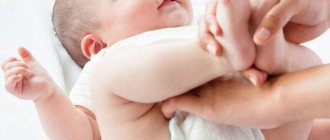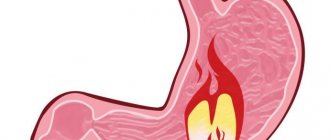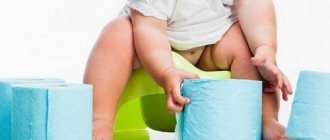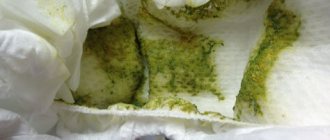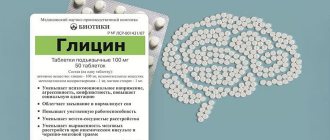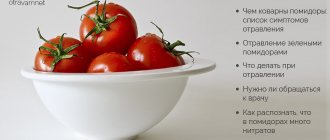Perhaps the most common situation that any adult has to deal with is diarrhea in a child. The functioning of a child’s body is not entirely smooth, so some parents take such situations calmly. It should be remembered that sometimes serious infectious diseases can cause gastrointestinal disorders and cause severe dehydration of a fragile body.
Diarrhea is stool containing a large amount of water, which is characterized by frequent and sharp urges with spasms that are difficult to control. The bowel movements increase greatly: the more often the child is drawn to the toilet, the thinner the consistency.
Mom and Dad should be concerned if the stool becomes profuse and has a greenish tint. It happens up to eight times a day or even more often. This poses a danger: a significant volume of water leaves the body and the substances necessary for its development are displaced; in addition, changes in the blood are noted.
The nature of the bowel movement will indicate the cause of what is happening:
- foam indicates the development of infection;
- green color is a sign of the development of staphylococcus;
- with salmonellosis, the normal color of stool changes to swamp;
- a sign of hepatitis is discolored stool;
- The infectious disease dysentery is associated with the crimson color of stool.
Causes
Why can loose stools torment children for several days, lasting 3, 5, 7, or even the tenth day? Diarrhea that lasts for the fifth day without fever in a child is a sign of a malfunction of the digestive system. When children suffer from this for several days, and the diarrhea goes away painlessly, it can be assumed that the gastrointestinal tract is independently cleansed of rotting products, toxins and mucus that have accumulated due to stagnation. A few days of a strict diet is enough for such a functional disorder to disappear.
Painless diarrhea that lasts 2 days can be caused by stomach upset due to food poisoning. Although for a small child any diarrhea becomes dangerous - 2, 5, 7 days. The fact is that it is quite possible that the body will become dehydrated, which can cause the development of dysfunction of any internal organs. Because of this, it is necessary to very closely monitor the general condition of the baby and immediately respond to the onset of any deviations in his condition. When diarrhea lasts more than two days, and is also accompanied by stomach pain, call a doctor home immediately.
All parents are required to know the characteristic features of the manifestation of the most common diseases of the digestive system in children, which may be accompanied by diarrhea, and therefore must respond to them correctly, taking emergency measures before visiting a doctor. What should be done when a baby has loose stools for 5 or 7 days? At first, just watch the process. If the disorder is mild, there is no fever, and diarrhea occurs no more than 4 times a day and the general condition does not suffer, the presence of nonspecific diarrhea, provoked by excessive consumption of certain foods, should be suspected. Although, in order to exclude another serious disease, the baby should be shown to the doctor. When he confirms the diagnosis, such loose stools can be treated with a diet, as well as the elimination of any foods that provoke the disorder from the diet.
Treat yourself or seek help
To avoid the unpleasant consequences of improper treatment of diarrhea, it is important to know when medical assistance is strictly required. Treating diarrhea in an infant, a one-year-old child and children under three years of age on your own is strictly prohibited.
During this period, all “adult” fixatives can cause significant harm to the baby’s body. In addition, it can be difficult to correctly distinguish the features of a physiological norm from a pathological digestive disorder.
Note! Diarrhea is a natural defensive reaction with which the baby fights toxic substances and infections that attack the body.
However, even in cases where the baby is more than 3 years old, sometimes calling a doctor is mandatory. Medical assistance is needed in the following situations:
- if an upset stomach is accompanied by foamy discharge or unusually colored stool;
- feeling weak due to high body temperature;
- there are other unpleasant symptoms, including loss of appetite, abdominal pain, nausea.
An ambulance should be called in the following situations:
- diarrhea occurred in the newborn;
- body temperature exceeds 39 degrees;
- the condition is accompanied by vomiting;
- there are signs of dehydration.
The greatest danger is dehydration in children under 1 year of age and newborns. If it is noticed that their fontanel is sunk, there is no urine output, a dry mouth and sticky saliva, they need to call an ambulance as soon as possible, otherwise death may occur.
Diarrhea 3 days
If you observe a malaise for 3 days in a small, still fragile child, which provokes loose stools, you should know the answers to the doctor’s questions. How did the diarrhea begin (moderate or acute), is there pain in the peritoneum, is there nausea, what is its intensity? It is very useful to constantly monitor the temperature indicator. When the answer to all questions is yes, the presence of viral gastroenteritis should be suspected. In such a situation, you cannot wait for 3 whole days; you should immediately call a doctor, trying to help the child while he is traveling.
It is important to immediately try to replenish fluid loss in the baby. Regidron is the best solution for this. It is necessary to dissolve a pack of this powder in a liter of water and give the child this drink every quarter of an hour. In this case, a single dose of use is calculated using a simple formula: for an infant, 10 mg of liquid is given for each kilogram of weight, and for older children the dose is doubled.
It is useful to put your baby on bed rest without giving him food until he visits the doctor. If loose stools last three days, accompanied by blood or mucus, and discomfort inside the stomach, a bacterial infection inside the intestines is likely developing. It is often accompanied by vomiting, although it can go away without such a symptom, but the temperature usually rises. When a baby has an intestinal infection:
- periodic stomach pain;
- Loose stools have been observed for more than three days;
- Symptoms disappear immediately when treatment is started correctly.
Often in children, three-day loose stools provoke food poisoning. Because of it, general intoxication occurs, so in addition to diarrhea, the child complains of a constant headache, he has bouts of vomiting, and paroxysmal cramps appear in the peritoneum. What needs to be done right away? Gastric lavage will significantly alleviate the child’s condition, but we must not forget about calling doctors.
Signs of poisoning are very similar to some of the symptoms inherent in a parasitic infection. With this diagnosis, three days of diarrhea is also possible, but the disorder can begin even after this period. The baby has severe bloating of the peritoneum, slight fever, and attacks of pain. Increased gas formation provokes their onset. It is prohibited to start treatment with folk remedies in such a situation. To obtain the desired effect, complex therapy is needed to defeat not only parasites, but also to eliminate their waste products and perform rehabilitation that restores the activity of the affected organs. Sometimes such a diagnosis requires hospitalization of the child.
Delay is dangerous if:
- diarrhea lasts longer than two days;
- diet does not eliminate diarrhea;
- with diarrhea, the stomach hurts very much;
- the stool is thin and dark, there is visible blood and a lot of mucus in it;
- acute diarrhea is observed in infants;
- loose stools are accompanied by a fever that does not subside for several days;
- diarrhea occurs frequently and without any prerequisites for it.
Only the doctor decides whether the child should be admitted to the hospital.
Treatment
If light green excrement is found in children, therapeutic measures should be taken. If this problem is the result of a gastrointestinal disease, treatment includes the following steps:
- Therapeutic diet. To normalize digestive function, the baby must undergo a course of a therapeutic diet. Without it, drug treatment will not give any results.
- Green diarrhea, which was caused by dysbiosis, is treated with probiotics. Children can be prescribed medications such as Bifilin, Linex, Biffifrom, Acipol, etc.
- If light green excrement appears as a result of intestinal infection, children are prescribed chemotherapy. For example, in this case they can prescribe Gentamicin, Nergam, Tienam, etc. Also, for intestinal infections, doctors prescribe immunoglobulins and enterosorbents for children.
- It is mandatory to take saline solutions. The most common solutions are Oralit and Regidron.
- Children are also prescribed a course of enzymes. For example, they may be prescribed Mezim-Forte, Pancreatin or Festal.
- If the illness occurs due to an allergic reaction, children should be prescribed anti-allergenic drugs.
- For severe diarrhea, accompanied by watery, light green excrement, children are prescribed antidiarrheal drugs. For example, they can be given Imodium or Diarol.
- To relieve your baby of pain due to a gastrointestinal tract disease, he should be given a myotropic antispasmodic, for example, Drotaverine or Papaverine.
When children do not suffer from gastrointestinal diseases, the presence of light green impurities in their stool may be a consequence of poor nutrition. In this case, home care will help get rid of this problem.
The dosage of any medication that the baby will take must be prescribed by a doctor. Therefore, before treating it with one drug or another, it is important to consult a pediatrician.
Otherwise, complications may arise:
- At high temperatures, convulsions may begin.
- Dysbacteriosis can give way to dermatitis or bronchial asthma.
- Dehydration of the body.
- Brain edema or neurotoxicosis. These are some of the possible complications of an intestinal infection.
- Arthritis, neuritis and intestinal bleeding. These are some of the side effects that may occur due to the lack of treatment for dysentery.
Diarrhea 4 days
Four days of diarrhea is called lingering sickness. It has several causes. The most common of them is poor digestion of foods. The symptoms of this diarrhea are as follows:
- loose stools last more than 4 days;
- it has increased volume;
- light color;
- very unpleasant amber.
Symptoms get worse when the child eats certain foods. For children, a characteristic symptom is a slight increase in weight due to insufficient digestion of food.
Severe four-day diarrhea, not accompanied by temperature changes, can last due to prolonged use of antibiotics. Usually, after stopping the use of such drugs, the stool condition quickly returns to normal. However, you should consult your pediatrician if your baby has a stomach ache while taking prescribed medications. Usually the doctor adjusts the therapy by immediately changing the previously prescribed medications.
Useful video
Health problems in young children undoubtedly worry their parents. Any even the slightest deviation in the baby’s well-being is a good reason to sound the alarm, but definitely be wary.
For example, analyzing the regularity of bowel cleansing and the quality of stool is an excellent way to monitor a number of processes in the child’s body. If monitoring of this type indicates the presence of stool in a baby about 2 years old, it is important for his mother to understand the cause of this phenomenon and begin to get rid of it. Otherwise, the risk of developing more serious health problems in the baby increases several times.
Disorder 5 days
If a child has had an upset stomach for five days, especially if the diarrhea is severe, it makes sense to visit the clinic to have a stool sample tested for bacterial culture. This study will help confirm or reliably refute the presence of viral or bacterial infections in the body.
The presence of prolonged diarrhea, lasting longer than five days, may signal an exacerbation of an existing chronic disease of the digestive system. Often, diarrhea that lasts longer than 5 days develops due to disturbed microflora inside the intestines. Dysbacteriosis is the most common provocateur of a protracted condition with loose stools. Several tests can confirm such a diagnosis, and their results will help you figure out how to quickly eliminate the cause of such an unpleasant condition.
Diagnostic measures
Before giving your child any medication or folk remedy for diarrhea, it is important to make sure that it will not harm his body. The safety of treatment can only be verified after an examination.
If the first signs of diarrhea appear, the following diagnostic measures may be recommended:
- stool analysis for the presence of eggs and parasites;
- analysis for dysbacteriosis;
- coprogram;
- X-ray;
- general blood test and biochemistry;
- Ultrasound of the gastrointestinal tract;
- bacteriological culture of feces and vomit.
The set of measures used for diagnosis may vary depending on the symptoms that arise, the age of the baby and other characteristics. The doctor decides which procedures are necessary after the initial examination.
Diarrhea 10 days
When a child suffers from diarrhea for 10 days, the doctor begins to suspect the presence of various serious pathologies. Traditionally, this is the duration of the acute phase of diarrhea. When the treatment undertaken for this symptom does not help, it enters its chronic phase, when loose stools indicate the presence of various dysfunctions in the functioning of the child’s body.
Ten days of diarrhea can provoke:
- Crohn's disease;
- irritable bowel syndrome;
- colitis;
- malabsorption syndrome;
- rectal oncology.
Each of these diseases is quite serious. Therefore, when a specialist makes such a diagnosis, it is necessary to immediately begin treatment.
What to do if your baby’s health worsens
Any medications should be taken only after consulting a doctor.
Although not often, it also happens that the baby’s well-being worsens after the appearance of loose stools.
Often in his state of health one can trace lethargy, drowsiness and weakness, which is accompanied by an increase in temperature, the development of loose stools into diarrhea and the appearance of vomiting.
In such a situation, you cannot hesitate - it is important to start doing everything possible to normalize the baby’s condition. The complex of therapeutic measures in such a situation includes:
- Showing the child to the doctor. It is advisable to carry out the measure as quickly as possible after the child’s well-being worsens.
- Organization of treatment prescribed by a specialist based on the results of the analysis and examination.
- Drink plenty of baby.
- Determining the correct diet for the child, the principles of which were described earlier.
- Listening to the baby and his well-being.
Remember that if you have diarrhea, you cannot force your child to eat. Feed your baby exclusively if he wants it, since force-feeding significantly worsens the course of gastrointestinal disorders.
Prevention of prolonged diarrhea
Functional illness that bothers a child for several days can be easily prevented if you follow certain rules:
- To prevent severe diarrhea, avoid expired foods, raw eggs and unsterilized milk.
- Be sure to carry out heat treatment of fish and meat products.
- All cutlery should be washed thoroughly after use.
- Store ready-made meals only in the refrigerator, since in the warmth bacteria quickly begin to multiply on them, causing prolonged diarrhea. Everyone should know what to do with expired food.
- When traveling abroad, children should not be given raw water to drink. It is necessary to use only bottled drinks, and from manufacturers whose reputation is beyond doubt.
- When visiting exotic countries, before eating fruits, you should not only wash them, but also completely remove the peel.
- On the territory of Central Asian states, it is better to refuse to purchase melons. There, to increase the weight of the berries, they are often pumped with raw water. After consuming such a product, lingering diarrhea is guaranteed to occur, which will be difficult to get rid of.
ethnoscience
It’s worth saying right away that traditional medicine should only become an additional treatment, and not the main one. Before using traditional medicine, be sure to consult with your doctor about the healing properties of a particular remedy and the advisability of its use.
Safe recipes for newborns:
- Pour boiling water over a small amount of dried pomegranate parts and leave for 1 hour. Strain the broth and give the baby 1 tsp. during the day.
- Pour a glass of rice with five glasses of water and simmer over low heat until fully cooked. Cool slightly, strain and give the child 50 ml every three hours.
In similar ways, you can help with diarrhea not only for the little ones, but also for older children.
Diarrhea in an infant: how to recognize and stop
Mom very quickly learns to recognize what exactly causes her baby to cry: whether it is hunger, a wet diaper, or an unpleasant sensation in the tummy. But if in the first two cases the problem is easy to solve, then, unfortunately, determining the root cause of abdominal discomfort is much more difficult.
Often, young mothers lose peace and sleep, blame themselves for the baby’s hypothermia, non-compliance with the diet and, as a result, spoiled milk, and also find thousands of other probable reasons. We warn parents against making premature conclusions and suggest that they look into this delicate issue.
Diet
For intestinal diseases accompanied by stool disorders, dietary table No. 4 according to Pevzner is prescribed. Until diarrhea and vomiting stop, you are allowed to eat only slimy soups with cereals, weak broths, boiled twisted lean meat and fish, steamed omelettes, mush porridge, dried white bread and crackers, biscuits, baked apples without peel.
While the temperature lasts, you can feed the child weak broth or thin porridge
For small children, the amount of food is reduced, while the frequency of feedings is increased. It is recommended to use mixtures that contain protective factors and introduce pureed, easily digestible food into the diet.
The temporary ban includes all dairy products, smoked foods, canned food, as well as spicy, fatty and fried foods, onions, garlic, radishes and soda. You must refrain from consuming these products for at least 3 weeks.
The digestive function of the intestine is completely restored 3 months after the infection.
